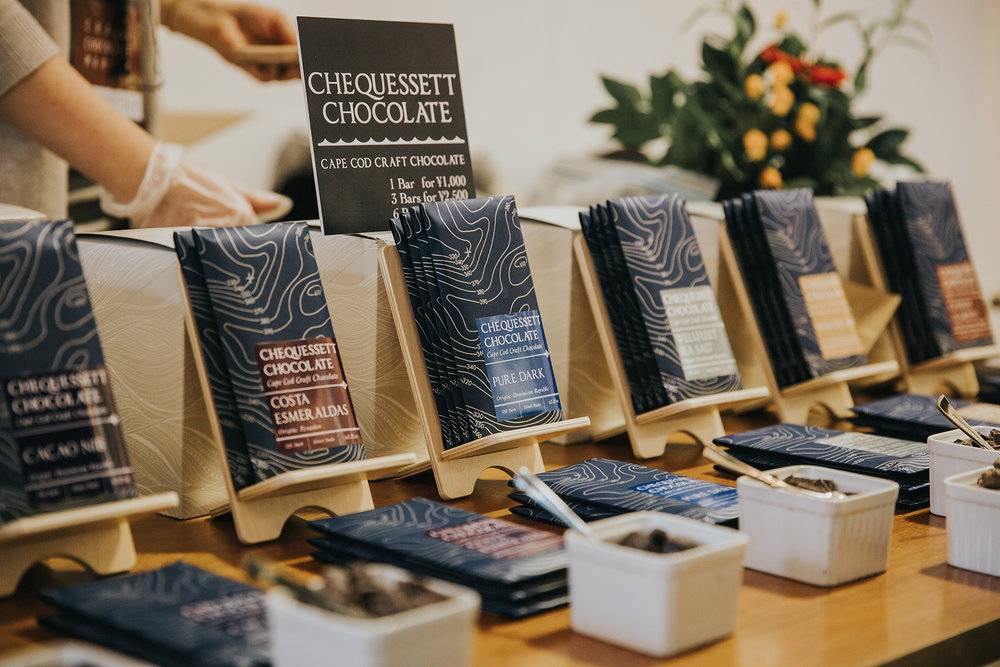By Carol K. Dumas
Make it and sell it. Sounds easy, right?
Thanks to the internet, it seems all one needs is an idea and an online “store.”
The reality is that start-up businesses have a high failure rate. According to the U.S. Small Business Administration, more than 50 percent of small businesses fail in the first year and 95 percent fail within the first five years.
Yet, the Creative Economy, as the Commonwealth of Massachusetts officially calls it, is thriving. Cape Cod and South Shore communities’ farmers markets showcase an array of local products and craft breweries are springing up everywhere. On Cape Cod, where jobs are few and the cost of housing expensive, making a living from selling your product can supplement a traditional means of income as well be a full-time job.
The ease of eCommerce is just one reason for the increase in local makers. There’s less loyalty to corporations who no longer pay pensions; even business schools are encouraging graduates to focus less on longevity at their first job and not work in one company for more than five years, says Rob Clark, chairman of SCORE Southeastern Massachusetts.
“I hear often, ‘All I have to do is get this on YouTube,’” says Clark, who is among retired corporate executives who mentor start-ups and also established businesses seeking a tune-up. “There’s also the view of “why do I want to work for ‘The Man’ when I can be successful at doing my own thing?”
While Clark says “enthusiasm and work ethic,” are key, most people fall short on the metrics needed for a new business to be successful, which is where SCORE’s mentors come in with a reality check.
Lack of job security or other financial circumstances can also fuel a start-up. For those who have slogged away in the corporate world, change can be liberating, although risky.
Master baker Peter and Nicole Nyberg, who had a career in marketing, had toiled years in corporate America, facing long, daily commutes and hectic travel schedules before opening Hearth Artisan Bread in Plymouth in 2010.
Their plan was to open an artisan bakery as a retirement business, years down the road, but unfortunately, the financial crisis of 2007-08 ate up their investments and retirement accounts and caused them to review their strategy.
“At that point, leaving our corporate jobs and going out on our own didn’t seem as risky as it once had,” says Nicole. “There are never any guarantees, sometimes you just have to go for it. Fortunately for us, things worked out well.”
They found prospects by searching the internet and driving around looking for restaurants and chefs that might be interested in their products, says Nicole. “Our wholesale business grew from there. It took time and we had bills to pay, so that was probably our biggest challenge – balancing everything as more customers joined the fold.”
The business started with one variety, an French Country loaf, and now offers several kinds, available at their retail store in Plymouth and served at several fine restaurants in Boston and on the South Shore.
Business 101
While you don’t need an MBA to sell your own product, not having a business plan can eventually catch up with a local maker.
“The numbers don’t lie,” notes Jill Beresford, a former CEO and now a small business counselor at the Massachusetts Small Business Administration, which offers free business advice to small businesses.
“There’s a narrative to a business plan; pricing, packaging, etc., but I start with the financials. You have to start testing financial projections, going forward. The companies I see fail don’t understand the financials.”
Kaitlyn Litchfield of Hingham was one of those local makers who presented an idea to Beresford. Her fledgling business selling was inspired by her personal experience shopping with her infant son. Her 10-month-old nearly toppled out of a shopping cart, despite being strapped into the seat. She found through research that 66 children a day go to the hospital after falling out of a shopping cart; some even die from their injuries.
She made her own admittedly “crude” prototype for The Original Shopping Cart Vest and presented her idea to Beresford who said, “You have an idea.” However, a more polished prototype would be needed. Litchfield connected with Saconic Design Works in Plymouth, who improved the design, which she brought to a Fall River manufacturer, which will produce the vest.
“It’s 100 percent Massachusetts-made,” Litchfield says with pride. “This is my community, the community that has supported me.”
Litchfield also secured a patent for her design, on the advice of her mentor.
SCORE mentors meet with clients to review the tenets of building a business, asking such questions as: Why are you doing this? Who is your customer? Where do you see the business in five years? What kind of capital do you need/have to start your business? “We never try to discourage anyone,” Clark emphasizes.
“But without a plan, that business can go sideways quickly.” Local makers should also be cognizant of any permits needed to make products out of their home, especially food items.
“We like to understand your passion, “ Clark says. “If we can help articulate your passion into a product or service and what that experience is, we can start quantifying that.”
Chequessett Chocolates’ co-founder Katherine Reed had that passion, initially for sea level rise and climate change, but she was not happy early on in a corporate job. While she and fellow business partner Josiah
Mayo were traveling in Costa Rica, they were enchanted after observing chocolate making on a very primitive level by a man in a simple hut. Cacao beans were sourced from a local farm, then roasted and ground. They believed they could translate that concept into a profitable Cape Cod business. They admittedly didn’t have a marketing strategy, per se, but chocolate making appealed to this young couple for several reasons: they could support sustainable agriculture and small farmers, two causes they were passionate about; their price point and profit would be higher as chocolate from higher grade cacao was a luxury market; chocolate was less perishable than other products and it could be sold online. To differentiate their product in the market, they planned to roast the imported beans on site, something many chocolatiers don’t do, preferring to buy huge blocks of commercial grade chocolate.
Their business was born six years ago in Chequessett Neck, Wellfleet, near Cape Cod Bay. “It was classic us, we just dive in and figure it out,” Reed says with a laugh. Today, they have a retail space in Truro in addition to their robust eCommerce business.

Reed was inspired a lot by podcasts such as “Corner Office” and “How I Built This.”
“Knowing you had company in the trough of sorrow was reassuring,” says Reed.
Susanna Locketti Sapir of Plympton worked two jobs, in TV and in human resources, before a gift of homemade salt changed her life.
“After the salt ran out, I decided to try making my own,” she recalls. “My first batch was dark, damp and loaded with pepper.” She refined the recipe, and then with a tax refund, gave it out as Christmas gifts in 2006. In 2013, she was asked to make 80 jars of her garlic-pepper salt as corporate jars and decided it was time to start a company. “I had an image of the modern woman and the resourceful Pilgrim.”
She uses fresh, organic and locally sourced ingredients (when available) and packages it in “pinch pots,” making 70 batches at a time. “I wanted to take a centuries-old icon of salt and pepper shakers and revolutionize the way we seasoned our food,” she explains.
While initially selling online and at farmers markets, her big break came when her product was featured on “The Queen Latifah Show” “and it put us on the map.”
Locketti Sapir is steadfastly frugal in her business strategy. “One of the biggest lessons I learned was to save every dollar I make and put it back into the business.”
Russ Heissner of Barrel House Z, a microbrewery founded in 2013, had industry experience before going out on his own. He was the first brewmaster at Harpoon Brewery before leaving in 1992 to work as an equipment manager for a company that made brewing systems and later worked in sales for BP. He studied fermentation science in college.
“Whether you’re a craft brewery or a software developer you have to be a person who has vision and real commitment,” he says. “You have to see what other people don’t see and take a risk. You need the ability to roll with the punches and you need a strong team to make it all happen.”
Financing The Dream
Not all local makers need financing, but the costs can be daunting for equipment, renting a space, setting up a commercial kitchen, buying a building, supplies, employees or doing eCommerce. Sometimes banks are reluctant to loan to businesses without a track record. Fortunately, there are some options for local makers and a lot of free advice out there from former corporate executives.
South Eastern Economic Development Corporation (SEED), based in Taunton and serving Massachusetts and Rhode Island, has loan programs for businesses who lack high credit scores and tax returns showing a record of business success. The nonprofit awards from 50 to 60 loans a year, through different programs, ranging up to $15 million for a Small Business Administration loan to Micro Loans for up to $50,000 for equipment and capital. Businesses who have been able to secure some funding from a bank can bridge the gap with SEED’s Revolving Loan Fund, which can provide up to $250,000 for working capital or fixed assets, says Jessica Mello, SEED Business Assistance & Marketing Officer.
SEED’s Business Center provides references to help start-ups; a library with more than 300 publications, videos, computer software, and Internet access for prospective or existing small business owners. SEEE also administer a small business technical assistance program and co-sponsors workshops with banks and chambers such as “Learn the Fundamentals in Planning, Preparing For, and Financing Your Business,” and
“Understanding the Purpose of Financial Statements and How They Can Help Determine the Health of Your Business.”
Keeping Connected
The connection with the customer is more immediate and personal with local makers than it is in a larger business and today’s consumer appreciates that touch in a culture of faceless internet shopping.
“I received an email from a mother who had questions about the fit of the vest for her child,” recalls Litchfield. “I said, ‘where are you now? I’ll meet you.’ I love being able to be a company that has a person behind it. I love it when people say, ‘I know her!’ It’s a connection I want to keep.”
Locketti Sapir feels likewise. Every order of Hippy Pilgrim Salt contains a hand-written note, thanking the customer for “allowing the Hippy Pilgrim a home in your kitchen.’ These people allowed me to stay at home with my children. It’s so important knowing who your customers are and making them feel a part of your business.”
Litchfield’s initial business strategy has been through “Mom to Mom” marketing. Knowing her customer would be mothers with small children, she reached out to local mothers’ groups, including Moms of the South Shore, to gauge interest and feedback for The Original Shopping Cart Vest, as well as from South Shore Young Professionals. She’s been promoting it on Facebook, Instagram and LinkedIn and the product is being sold on her web site.
A portion of her profits will be donated to a local autism foundation, a cause dear to her heart since her son has autism.
Joining a local business groups and chambers of commerce are good ways to grow a local maker’s network. Chamber memberships offer seminars and events to promote even the smallest business, and outreach via frequent eNewsletters.
Keeping it local
Locally made products are unique and naturally appeal to tourists, which fuel Cape Cod’s economy. Still, the pull and ease of online shopping through giant retailers like Amazon continues to threaten the creative economy.
“Online shopping is not going to go away and I get that,” says Amanda Converse, one of three women who founded Love Live Local in 2013 on Cape Cod. The organization supports local makers and connects them with consumers through a newsletter, a web site, a print guide to local makers and a summer festival. The company also has a store in Hyannis showcasing products by local makers and cottage industries.
Love Live Local plans to unveil an eCommerce site this year, just for Cape Cod business. “We have to at least try and keep some of this market share. It will be targeted to local makers, growers, and even your neighborhood hardware store. They just have to be Cape Cod-based.”
Beth Marcus, co-owner with her husband Todd of the microbrewery Cape Cod Beer, also works tirelessly to support local makers, featuring many locally made items in the brewery’s retail shop and hosting an artisans market on Saturdays in the parking lot. maker, Marcus recalls the early days of Cape Cod Beer and supporting other local makers is a way to give back. “We pretty much boot-strapped our own business,” she says with a laugh. “As we grew, we kept doubling down to keep it local,” says Marcus.
For example, she found a local company to embroider on Cape Cod Beer t-shirts and caps, instead of having that task done in China. The Marcuses hired Cape metal worker-artist Steve Swain to design unique beer taps. They use Chequessett Chocolate to make one of their beers and Cape Cod candy, bread and soap makers use Cape Cod Beer in their products.
“There’s a multiplier effect of ‘local,’” she adds. “It’s a culture and people who care about this.”























